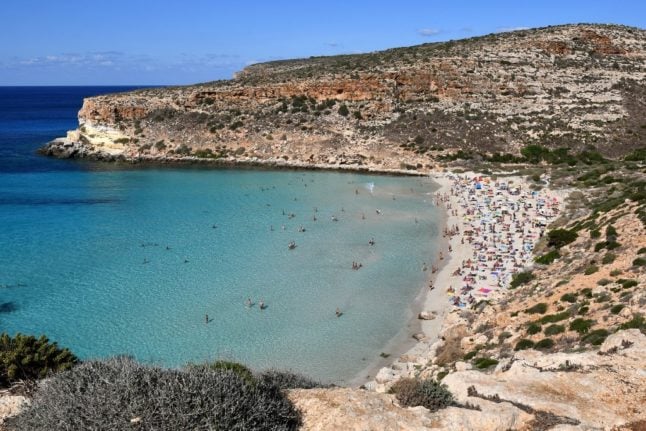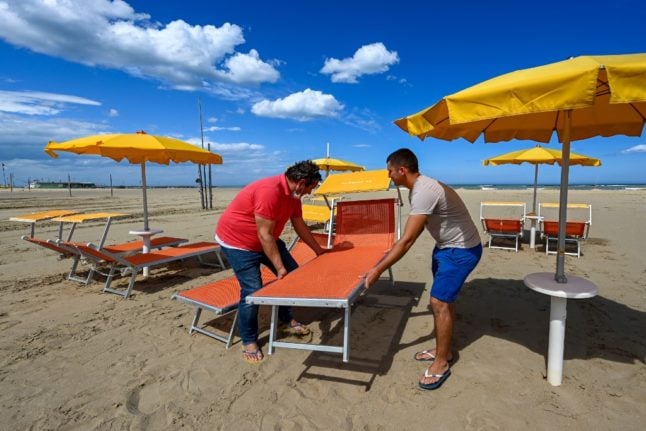Italy’s tourism minister has announced the return of its summer ‘holiday bonus’ scheme under which lower-income households could receive up to €500 each.
First introduced in May 2020 under the ‘Relaunch Decree’, the bonus vacanze or ‘holiday bonus’ aims to boost Italy’s tourism sector, which accounts for 15 percent of the country’s jobs and has been hard hit by ongoing travel restrictions due to the pandemic.
READ ALSO: Italy’s tourism industry reports €120 billion loss in 2020
The government set aside 2.6 billion euros to give households earning less than 40,000 euros a year a financial incentive to holiday in Italy rather than go abroad.
But issues with using the scheme last year meant most of the pot has gone unused – and now the payments are being made available for summer 2021.

“The holiday bonus has been extended,” Italian Tourism Minister Massimo Garavaglia said on Rai 1, explaining that most of the funds made available in 2020 had not been claimed.
“There was a problem with (the scheme),” he said. “820 million of the 2.6 billion allocated has been spent, so a lot of the funds are still available.”
“If it worked well, it would already have been used,” he said, adding that the ministry had tabled some amendments to the way the scheme works.
While Italy has not yet confirmed whether and how much international tourism will be allowed this summer, Garavaglia stressed the importance of domestic tourism to keeping businesses afloat.
READ ALSO:
- Summer rental boom: Italy reports surge in holiday bookings from the UK and US
- When will Italy relax the restrictions on international travel?
- ‘Green pass’: How Italy’s coronavirus immunity card works
“It’s clear that this will be a summer of Italian tourism in Italy, even if there is some recovery from abroad as we are moving towards using the European green pass,” he said.
Last year, some small accommodation owners criticised the bonus scheme, saying it only helped large hotel chains or others who had enough resources to be able to absorb financial losses until they could claim tax credits at a later date.
The tourism ministry has proposed the following changes to the way the scheme works under an amendment to the support decree, which is set to be discussed in early May:
- Postponing the expiry of the scheme from December 2021 to summer 2022;
- Allowing travel agencies to claim the discounts on behalf of clients
- Allowing the bonus to be divided between several business or used in installments over several trips.
For now, here’s how the bonus worked in summer 2020:
Who can claim the ‘holiday bonus’?
There are two conditions:
1) It’s for residents, not overseas visitors: you must pay taxes in Italy, since part of the bonus takes the form of a tax deduction.
2) It’s for lower-income households: your combined income, as calculated on your ISEE or ‘Equivalent Economic Situation Indicator’, should total no more than €40,000 per year.
Families, couples and individuals can all apply for the bonus. If you’re applying as a couple or family it will be paid per household, not per person.
It is not yet known if people who used the bonus in 2020 would be eligible to claim a second time in 2021.
How much is it worth?
The government last year offered €150 to people travelling on their own, €300 for two people and €500 for families of three or more.
How does it work?
To claim the holiday bonus, you’ll need to use the government’s IO app and either your electronic ID card or SPID.
READ ALSO:
The bonus is paid out in two ways: 80 percent of the cost will be shouldered upfront by your hotel, B&B, agriturismo or other accommodation and should be discounted directly from your bill.
Under current rules, you’ll only be able to claim the bonus from a single place of accommodation
Accommodation owners must then claim the money back from the government in the form of a tax credit. They’ll need to make a note of your personal codice fiscale (tax code) and issue a complete bill or receipt.
The 2020 decree stated that payment must be made directly by the guest or via a travel agent, but not through any other kind of portal or intermediary such as Airbnb or Booking.com.
It was then up to guests to claim the remaining 20 percent of the bonus, which can be deducted from your tax bill for the financial year.
Some of these rules could change once the extended support decree, known in Italian as the decreto milleproroghe (decree of a thousand extensions), is approved in May.



 Please whitelist us to continue reading.
Please whitelist us to continue reading.
Member comments